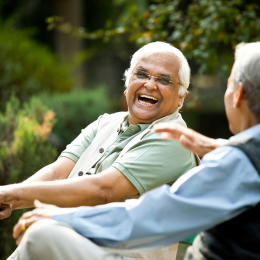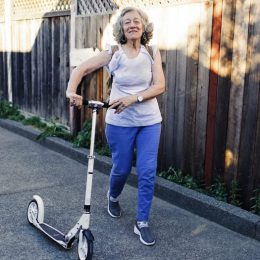6 Old-School Habits You Should Never Stop
Progress is good—except when it comes to these activities, which help keep your brain sharper, longer.

Some things belong in the past, like lead paint and lobotomies. But others are worth keeping, even if younger generations don’t seem to value them as much.
Certain old-school habits (including a few that millennials love to make fun of) can actually give your brain a boost, says William Greenough, M.D., a Johns Hopkins professor of geriatric medicine.
Here are six such examples—all on the endangered habits list. If you enjoy them, keep it up! You’ll not only boost brainpower, but you might even gain an edge over those snarky grandkids of yours.
Healthy Habit #1: You Talk to Actual People
Interacting with real people stimulates more parts of the brain than gaming or texting, says Ronan Factora, M.D., a geriatric medicine specialist at the Cleveland Clinic. You’re forced to pay attention, remember what someone said, and decipher nonverbal cues and facial expressions.
“All of this helps you build a cognitive reserve,” he adds, “fortifying your brain against sickness and disease.”
A recent research review of 39 studies found a strong link between social activity and better brain function in adults older than 50. Socializing may also benefit working memory, which is essential for navigating social interactions, the analysis found.
Connecting with people in real life may also fight depression. A study in the Journal of the American Geriatrics Society found that older adults who met with family and friends at least three times per week were least likely to be depressed (6.5 percent risk) compared with those who met up once every few months or less (11.5 percent risk).
Your move: Try to interact with people at least four days per week and more if you can, Dr. Factora says. That means spending time with family, friends, community groups, or even just visiting your local café or taking a SilverSneakers class where you can talk to people.
If transportation is a challenge, don’t be afraid to ask for help, Dr. Factora says. Start by asking family or friends if they’re near. You may also want to check local resources for any transportation services.
Healthy Habit #2: You Have Real Hobbies
Just because you enjoy doing something doesn’t make it a hobby, says Dr. Factora. A true hobby is something you can get better at, such as playing a musical instrument or ballroom dancing.
Adopting these types of “cognitive-stimulating activities” can reduce your risk of dementia and improve your quality of life, Dr. Factora says.
It may also help you live longer, according to a 2016 study from Japan. Adults ages 65 and older who reported having both hobbies and a purpose in life were half as likely to have died during a three-year follow-up, compared with those who reported having neither. They also experienced fewer declines in daily functioning.
In addition, those who had a purpose but no hobbies were also more likely to die or experience functional declines during the study.
Your move: Find something you enjoy that you can continue getting better at. You reap brain benefits from hobbies by progressing to more and more challenging levels, Dr. Factora says.
Even better, pick a hobby that makes you move. “Linking mental and physical activity is key to a long life,” says Dr. Greenough, who suggests gardening, golf, tennis, cooking, or picking up an old hobby you enjoyed as a child.
Healthy Habit #3: You Write Letters
Learning to use email and text is useful for older adults, Dr. Factora acknowledges. “But writing letters is a lot more involved in terms of content expression and vocabulary use,” he adds. “Using longer formats helps preserve the area of the brain involved in language.”
Plus, research shows writing by hand activates different areas of the brain—those involved in literacy and learning—than typing does. That’s why writing something down generally helps you remember it better.
“Anything that makes you sit down and compose something to communicate to another human, particularly with pen and paper, is a very constructive activity,” says Dr. Greenough, who writes letters to his children instead of messaging them on Facebook.
Your move: Set aside 15 to 30 minutes, one day a week, to write some letters. (Dr. Greenough writes every Sunday.) Every note will bring joy to both you and the recipient, Dr. Greenough says.
Healthy Habit #4: You Read the Newspaper
Eighty percent of adults over 65 get their news strictly from print newspapers, while, not surprisingly, millennials and gen Xers are much more likely to get their news online.
Beyond being qualitatively different (you don’t have to wade through digital ads), reading a newspaper helps maintain your mental capacity as you age, Dr. Greenough says.
Newspaper articles are generally longer and use a higher level of vocabulary than online stories, Dr. Factora says. This boosts literacy and cognitive function. Plus, those who read a local paper may feel more connected to their communities.
Bonus: Newspapers almost always include crossword puzzles, which research shows may delay cognitive decline in people who develop dementia.
Your move: Start your day with a paper, not a screen. “For older, retired folks, every day can feel like Saturday,” Dr. Factora says. “Reading the newspaper first thing helps establish a daily routine, keeping you oriented.”
Healthy Habit #5: You Take Walks
When it comes to fitness, some young people subscribe to the “go big or go home” mentality. This can lead to an all-or-nothing mindset.
“Sprinting or doing an activity that is punishing is no better than a gentler activity,” Dr. Greenough says. Simply walking has plenty of heart and brain benefits, and it’s certainly better than nothing.
Subscribe to our newsletter
It's quick and easy. You could be one of the 13 million people who are eligible.
Already a member? Click to discover our 15,000+ participating locations.
Follow Us
“Do something that makes you breathe a little faster and raises your heart rate,” Dr. Greenough says.
A study published in PLOS Medicine found that walking 30 minutes per day, five days per week can increase lifespan by an average of 3.5 years. For people who are obese, the benefit is even greater: 4.2 years.
Your move: If you don’t already have a walking routine, start by walking five to 10 minutes, three times per day.
Once you’ve got the hang of that, increase your exercise duration until you’re walking for 30 minutes at a time, ideally five days per week. Pay attention to your pace: If you can carry on a lengthy conversation without effort, it’s time to speed up.
Get moving with these simple strategies to walk more each day, or download any of these free guided audio walks:
- 10-Minute Walk
- 20-Minute Moderate Walk
- 30-Minute Moderate Walk
- 45-Minute Brisk Walk
- 60-Minute Long Walk
Healthy Habit #6: You Watch a Single TV Episode (Not an Entire Series) in One Sitting
TV watching isn’t what it used to be. These days, 61 percent of adults under 30 use streaming services like Netflix or Hulu to watch TV instead of standard cable. This unprecedented access to TV content has spawned a whole new way of viewing: binge-watching, or consuming more than one episode at a time.
Here’s the bad news: A JAMA Psychiatry study that tracked people’s TV viewing habits over 25 years found those who got little exercise and watched three or more hours of TV a day saw more cognitive decline than those who exercised more or watched TV less.
Older folks can be guilty of watching too much TV too, Dr. Factora notes.
“They don’t necessarily binge-watch a single show, but they will watch a channel for long periods of time, viewing baseball games and westerns to their heart’s content,” he says.
The real problem isn’t what’s on the screen—it’s the prolonged periods of sitting that often go along with TV watching.
Your move: Take breaks. If you’re watching TV or a movie, be sure to get up and move every 30 minutes, Dr. Greenough recommends. And turn off the tube at least 30 minutes before bedtime for better sleep.
Check Your SilverSneakers Eligibility Instantly
SilverSneakers gives you free, unlimited access to more than 16,000 gyms and fitness centers across the nation, plus classes and tools designed to keep older adults strong and independent. Check your eligibility instantly here.
Already a member? Get your SilverSneakers member ID and exclusive content by logging in to or creating your online account here.





